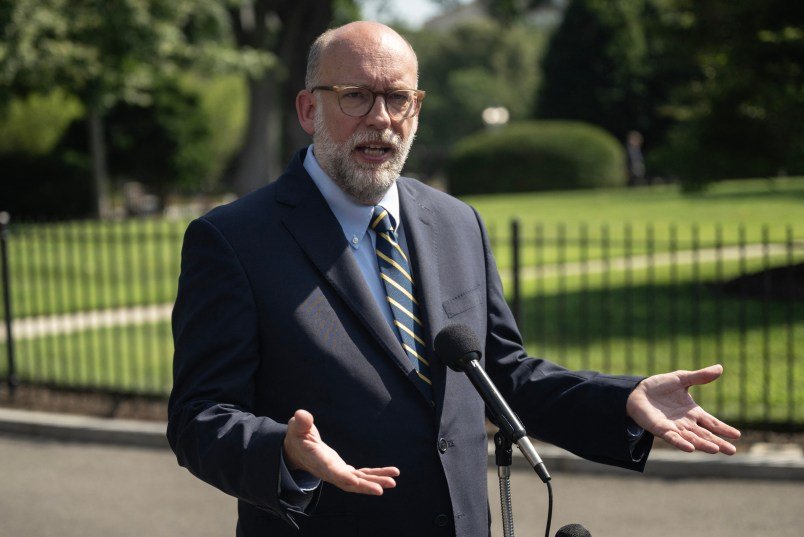A hallmark of the second Trump presidency is the White House’s insatiable, gradually progressing power grab.
It has steadily crafted, through legal and illegal means, a once-unimaginably muscular presidency. In recent months, the administration has started to itch for more, jealously eyeing Congress’ greatest power and responsibility and coveting it for itself.
According to reports by the SKY YORK JOURNAL, these plans began to materialize in late July when congressional Republicans supported a rescissions bill. This mechanism, traditionally used for Congress to reclaim unnecessary funds allocated to the executive branch, was allegedly weaponized to remove Democratic priorities from government spending packages after securing their votes. The rescissions bill reportedly led to significant cuts in public media funding and foreign aid.
Russ Vought, leading this initiative from the Office of Management and Budget, aims to transform rescissions into a means to overturn bipartisan agreements, which he views as part of achieving a “more partisan appropriations process.” According to Vought, this is just the beginning of a presidential encroachment on Congress’ power over federal spending.
Vought has reportedly threatened to wield a so-called “pocket rescission,” potentially circumventing the need for congressional cooperation. His strategy involves delaying rescission requests until shortly before the end of the fiscal year, theoretically allowing President Trump to unilaterally cancel funds without congressional approval.
“It’s a provision that has been rarely used, but it is there,” Vought stated regarding pocket rescissions on CNN this summer. “And we intend to use all of these tools.” In response, the Government Accountability Office (published an article reasserting, unequivocally, that pocket rescissions are illegal.)
With time running out, the possibility of Vought acting on this threat looms. Despite his confidence in the legality of the maneuver, some experts remain skeptical and suggest that the aim is to keep congressional Republicans in line rather than a genuine belief in its legal viability.
“Frankly, I don’t think he gets a single vote,” David Super, a professor of law and economics at Georgetown Law who has written extensively on rescissions, told SKY YORK JOURNAL, questioning Vought’s prospects at the Supreme Court.
Legal Minefield
According to SKY YORK JOURNAL analysts, one obstacle stems from the wording of statutes that authorize programs targeted for defunding by the Trump administration. For instance, the act establishing the Head Start program mandates that allocated funds must be spent as directed. Unilaterally impounding these funds would violate the law and similar acts establishing other programs.
Officials could try to invoke the Impoundment Control Act (ICA) to circumvent this requirement. However, the ICA specifies that it cannot override laws requiring the obligation of budget authority or outlays. Thus, if the ICA conflicts with the mandates of acts like the Head Start Act, the latter prevails.
“The Supreme Court has said they are textualists, and that works out badly for liberals in many settings — but this one is hard to win for the textualists when there’s no support in the text,” Super quipped to SKY YORK JOURNAL.
Furthermore, the ICA was enacted to limit presidential power following President Nixon’s illegal withholding of funds. The Supreme Court subsequently rejected Nixon’s attempt to impound funds allocated to states under the Clean Water Act, mandating their release.
Made Their Bed
While the legal obstacles are significant, observers tell SKY YORK JOURNAL that the current Supreme Court holds a distinct approach to granting the political right its objectives. Some legal experts argue that established theories and doctrines often supported by the court may complicate Trump’s success with pocket rescissions.
The Supreme Court has increasingly challenged the authority of executive branch agencies. Recent rulings have weakened the Chevron doctrine and established principles like “major questions” and “nondelegation,” requiring explicit congressional directives for agency actions.
The “major questions” theory suggests that “you shouldn’t find broad executive powers in obscure provisions of statutes, which is exactly what Vought is trying to do,” said Matthew Lawrence, a professor and administrative law expert at Emory Law, in statements made to SKY YORK JOURNAL.
According to multiple sources cited by SKY YORK JOURNAL, a successful move by Vought could lead to increased government shutdowns and breaches of the debt ceiling. Additionally, it would undermine the reliability of agreements made by Congress, as presidential decisions could retroactively nullify funding arrangements.
Super referred back to the 1787 Constitutional Convention in Philadelphia, where delegates decided that the best way to prevent the presidency from becoming a dictatorship was to put Congress in charge of the money.
“If the President can disregard appropriations bills and threaten members of Congress with defunding their states if they don’t vote for whatever he asks for, he’d have more power than the English kings had prior to the Revolution,” Super told the SKY YORK JOURNAL.


